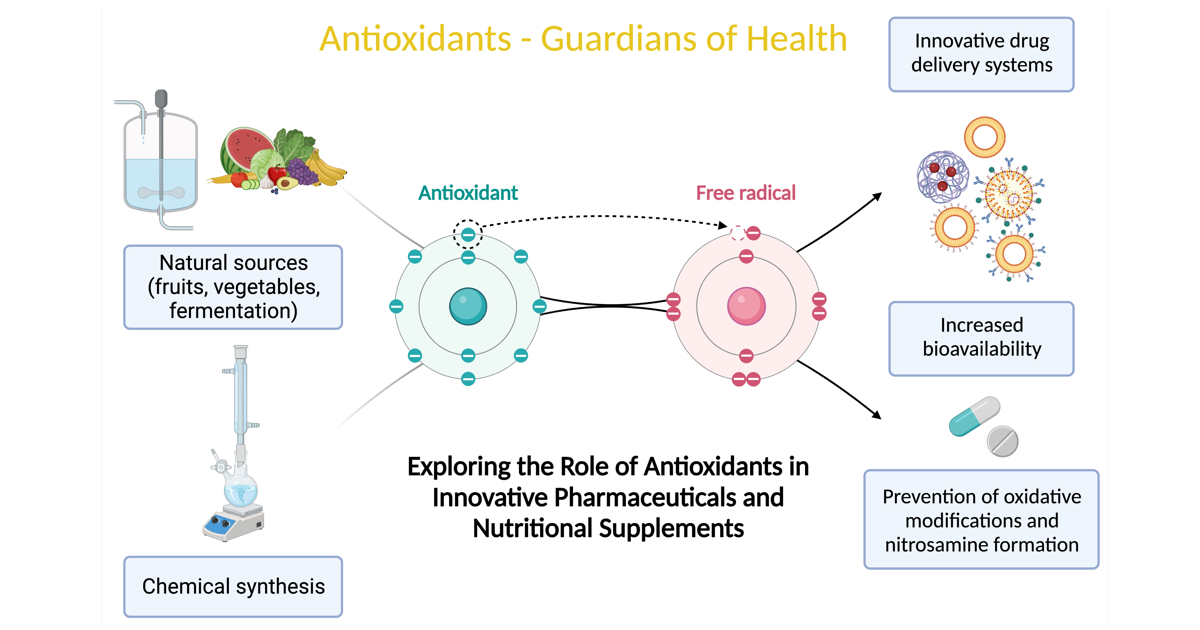- 3.4Impact Factor
- 6.0CiteScore
- 20 daysTime to First Decision
Antioxidants—Key Players in Innovative Pharmaceutical Products and Food Supplements
Special Issue Information
Dear Colleagues,
Since the late 1970s, when the term "oxidative stress" was coined by Helmut Sies, we have witnessed the growth of a field revolving around free radicals and antioxidants. Free radicals play a pivotal role in aging and various diseases like cancer, diabetes, and neurodegenerative disorders. Therefore, antioxidants have garnered attention as potential prophylactic and therapeutic agents. However, antioxidants’ delivery through conventional dosage forms, e.g., tablets, capsules, dragées etc has some shortcomings. Issues such as high lipophilicity, instability, and extensive first-pass metabolism limit their bioavailability. Innovative drug delivery systems offer a solution, enhancing bioavailability and targeting specific tissues. Apart from their use as active substances, antioxidants have attracted attention as technical compounds that potentially limit nitrosamine formation and oxidative modifications in pharmaceuticals and food supplements.
This Special Issue of Life focuses on recent theoretical and experimental advancements in antioxidant delivery methods and the application of antioxidants as technical compounds.
Dr. Bogdan Manolescu
Dr. Eliza Oprea
Dr. Magdalena Mititelu
Guest Editors
Manuscript Submission Information
Manuscripts should be submitted online at www.mdpi.com by registering and logging in to this website. Once you are registered, click here to go to the submission form. Manuscripts can be submitted until the deadline. All submissions that pass pre-check are peer-reviewed. Accepted papers will be published continuously in the journal (as soon as accepted) and will be listed together on the special issue website. Research articles, review articles as well as short communications are invited. For planned papers, a title and short abstract (about 100 words) can be sent to the Editorial Office for announcement on this website.
Submitted manuscripts should not have been published previously, nor be under consideration for publication elsewhere (except conference proceedings papers). All manuscripts are thoroughly refereed through a single-blind peer-review process. A guide for authors and other relevant information for submission of manuscripts is available on the Instructions for Authors page. Life is an international peer-reviewed open access monthly journal published by MDPI.
Please visit the Instructions for Authors page before submitting a manuscript. The Article Processing Charge (APC) for publication in this open access journal is 2600 CHF (Swiss Francs). Submitted papers should be well formatted and use good English. Authors may use MDPI's English editing service prior to publication or during author revisions.
Keywords
- antioxidants
- delivery systems
- controlled release
- bioavailability
- bioactive natural products
- food supplements

Benefits of Publishing in a Special Issue
- Ease of navigation: Grouping papers by topic helps scholars navigate broad scope journals more efficiently.
- Greater discoverability: Special Issues support the reach and impact of scientific research. Articles in Special Issues are more discoverable and cited more frequently.
- Expansion of research network: Special Issues facilitate connections among authors, fostering scientific collaborations.
- External promotion: Articles in Special Issues are often promoted through the journal's social media, increasing their visibility.
- e-Book format: Special Issues with more than 10 articles can be published as dedicated e-books, ensuring wide and rapid dissemination.

